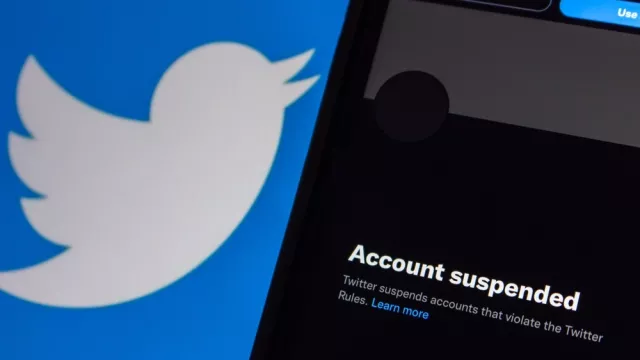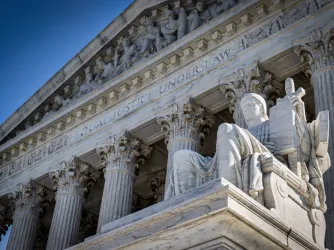Table of Contents
Twitter removes ‘Trans Day of Vengeance’ posts in another loss for free expression on the platform

Sergei Elagin / Shutterstock.com
Over the last couple of days, Twitter has removed thousands of tweets referencing or promoting a flyer for the “Trans Day of Vengeance,” a transgender rights protest taking place in Washington, D.C., on Saturday. The broad ban has impacted both supporters and critics of the trans rights movement. Twitter says the ban is the result of an automated process of removing tweets that violate its content policies, including prohibitions on content that incites violence.
In explaining the ban, a Twitter representative said, “‘Vengeance’ does not imply peaceful protest.” However, some trans activists say that “vengeance” is not about violence, but rather “fighting back with vehemence.” Critics of the protest are also frustrated, seeing the ban as preventing them from speaking out against the event.
This incident demonstrates the problem with vague and overbroad speech codes enforced with no regard for the speaker’s intent. As a private company, Twitter is not bound by the First Amendment. But as a platform that hosts public conversations among over 300 million people, it would do well to look to long-established First Amendment principles when formulating its speech policies.
Banning specific words, phrases, or images regardless of context is an especially blunt form of censorship.
In the First Amendment context, incitement is unprotected, but it’s narrowly defined as speech that is “directed to inciting or producing imminent lawless action and is likely to incite or produce such action.” That strict standard appropriately allows authorities to intervene in very limited circumstances to prevent imminent physical harm, while otherwise allowing the widest possible range of expression. It minimizes the risk that speakers will be censored merely for their views or passionate advocacy.
Twitter’s new “Violent Speech Policy,” on the other hand, creates a significant risk of abuse. It fails to define “incitement of violence,” and prohibits even “using coded language (often referred to as ‘dog whistles’) to indirectly incite violence.” By giving itself general permission to ban even “indirect” incitement — which, again, is left undefined — Twitter puts a huge amount of political speech at risk of suppression. Does tweeting “ACAB” indirectly incite violence against police officers? Does tweeting that the southern border is being overrun by criminals indirectly incite violence against immigrants?
Twitter’s moves as of late do not inspire confidence that the platform is entering a new golden age of free speech.

Far from free speech savior, Elon Musk increasingly looks like a false prophet
Twitter suspended the accounts of numerous journalists who Twitter owner Elon Musk accused of doxing him and his family.
Banning specific words, phrases, or images regardless of context is an especially blunt form of censorship. It can create an environment in which it is exceedingly difficult if not impossible to talk about an issue of public concern. It’s one thing for Twitter to remove a post with the “Trans Day of Vengeance” flyer if the post explicitly calls for violence. But the platform’s broad ban swept up other speech promoting the event, speech criticizing the event, and could even have reached commentary on the ban itself.
When Twitter considered censoring the term “stopthesteal” in the aftermath of the 2020 presidential election, it discovered that the “top” tweets mentioning the term were attempts to criticize and rebut claims of election fraud. Censoring “stopthesteal” would have suppressed speech and counterspeech on a salient issue of public debate. Twitter also ran into issues trying to censor the term “kraken” in its attempts to crackdown on election misinformation. It turns out Kraken is also the name of a cryptocurrency app, not to mention an NHL team and a mythical Scandinavian sea monster.
Or take Facebook’s removal of a post that used a Persian slogan that literally translates to “Death to Khamenei,” Iran’s political and religious leader. Facebook’s Oversight Board overturned the platform’s decision, finding that the slogan is often used as political rhetoric to mean “down with Khamenei,” and Iranians have for years used it to protest their government’s repressive tactics.
These instances of censorship not only silence the speaker, they prevent the rest of us from knowing what other people actually think and believe — from knowing the world as it really is. If, for instance, a large number of people think violence is an acceptable remedy to their problems, that’s useful information for the rest of us to have as we navigate social interactions and the world at large. We’re not better off burying our heads in the sand while our neighbors are preparing to fight.
It turns out Kraken is also the name of a cryptocurrency app, not to mention an NHL team and a mythical Scandinavian sea monster.
Twitter, Facebook, and other social media companies have lots of room for improvement when it comes to content moderation. Online free speech does not benefit from unclear, convoluted rules enforced by people and flawed algorithms that either ignore or fail to comprehend the complexity and nuances of human communication.
As FIRE has said before, social media platforms should use clear, narrow, and transparent categories to define prohibited speech. Vague and overbroad moderation policies result in subjective interpretation and arbitrary enforcement and leave users without a clear picture of what they’re allowed to say.
Social media platforms should approach content moderation with a light touch — using a scalpel, not a hatchet — to allow for vigorous discussion of public issues.
Recent Articles
Get the latest free speech news and analysis from FIRE.

The federal charges against Don Lemon raise serious concerns for press freedom

The American people fact-checked their government

California prohibits its teachers from talking about a student's gender identity to their parents. That raises First Amendment concerns.


